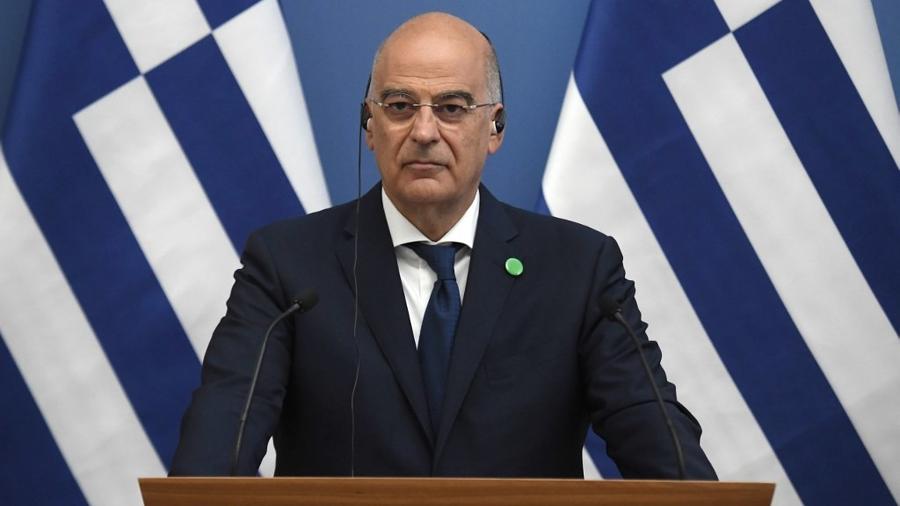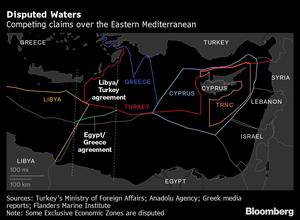 Greek Foreign Minister Nikos Dendias gives a joint press conference with the Hungarian Foreign and Trade Minister after a meeting in Budapest on October 2, 2020. (ATTILA KISBENEDEK / AFP)
Greek Foreign Minister Nikos Dendias gives a joint press conference with the Hungarian Foreign and Trade Minister after a meeting in Budapest on October 2, 2020. (ATTILA KISBENEDEK / AFP)
Greece called on its European partners to set clear limits on what actions they will tolerate from Turkey in the increasingly tense eastern Mediterranean.
“Europe cannot pretend that Turkey is acting as an acceptable player in the region,” Foreign Minister Nikolaos Dendias told Bloomberg News in an interview Wednesday.
Greece expects European Union leaders to make clear that the bloc agrees that Turkish actions in the region are damaging. The EU will need new measures to curb Ankara’s “delinquent and provocative policy,” Greek Foreign Minister Nikolaos Dendias said
Greece expects European Union leaders to make clear that the bloc agrees that Turkish actions in the region are damaging. The EU will need new measures to curb Ankara’s “delinquent and provocative policy,” the minister said.
Tensions between Greece and Turkey have been higher than usual since the summer, when Turkey started gas and oil searches in contested sections of the eastern Mediterranean Sea.
European leaders in October called on Ankara to abstain from unilateral hydrocarbon exploration in disputed waters, saying it’s in breach of international law. Turkey nonetheless resumed the surveys, making any negotiation with Greece on delimitation of sea borders even more problematic.
ALSO READ: Erdogan sees Turkey's future with EU despite sanction threat
“Certainly we are in a critical moment in our relationship with Turkey,” EU Foreign Policy Chief Josep Borrell told the European Parliament Tuesday in Brussels. “Leaders will have to take a decision” on whether to adopt more sanctions, he said.
“Europe must show the limits of that behavior,” as it’s against everything the EU stands for, Dendias said in the interview. If action isn’t taken, other countries could conclude that they can act with impunity and “Turkey will have the impression it can continue its current behavior without any restriction,” he said.
Turkish President Recep Tayyip Erdogan said Saturday that his country wants to engage with Europe. Speaking ahead of a December EU summit, Erdogan said Turkey sees itself as “in Europe, not anywhere else, and we want to build our future with Europe.”
ALSO READ: Germany angers Turkey with attempt to police Libya arms embargo
If the cooperative signals from Ankara mark “the beginning of a complete change of course for Turkey, no one will be happier than Greece,” Dendias said. If Turkey abides by international norms, “no one will encourage it more.”
Arms embargo
Greek authorities have also asked European partners including Germany to halt weapons sales to Turkey.
“Germany, as the largest country and economy of the EU, has the checks and balances in place to stop the need to export arms to countries that will turn them against two members of the EU,” Dendias said, referring to his country and to Cyprus.

Greece has called on its European peers to respect the bloc’s mutual defense clause, which commits members to assist “by all means” if another EU state is a victim of armed aggression. Greece also accuses Turkey of repeated violations of the EU-Turkey customs union through new tariffs.
France is leading a push for EU sanctions on Turkey next month but has yet to win support from EU governments beyond Greece and Cyprus, officials and diplomats said.
The European Parliament on Thursday is expected to call for sanctions, decrying Erdogan’s visit earlier this month to the breakaway Turkish Cypriot north of the island of Cyprus.
“Turkey knows what it needs to do,” France’s Foreign Minister Jean-Yves Le Drian told a French parliamentary hearing this week. “Confrontation or collaboration, it’s up to them.”
The Turkish Foreign Ministry has criticized the EU for discussing sanctions, saying such debate was not helpful.
No detailed sanctions have been drawn up by France, but diplomats say any measures would hit areas of Turkey’s economy aimed at limiting Turkish hydrocarbon exploration, likely in shipping, banking and energy.
Also at stake are a plan to broaden Turkey’s trade preferences with the EU, its top trading partner, and its formal status a candidate to join the EU, which Austria says should end. Erdogan has called for a boycott of French goods, which one EU diplomat said did not bode well for deeper trade relations.
The Mediterranean dispute hinges partly on interpretations of international law. Greece maintains that islands must be taken into account in delineating a country’s continental shelf, in line with the United Nations Law of the Sea, which Turkey hasn’t signed.
READ MORE: EU calls on Turkey to take actions to deescalate tension
Ankara argues that a country’s continental shelf should be measured from its mainland, and that the area south of Kastellorizo -- just a few kilometers off Turkey’s southern coast -- falls within its exclusive economic zone.
Disputed waters
The Greek government has said it’s ready to talk with Turkey on maritime delimitation. If the two countries can’t reach an agreement, they should refer the issue to the International Court of Justice, Athens says.
“If the Turkish side wants to find solutions with Greece, this should be very easy,” Dendias said. “We have found solutions with all our other neighbors.”
With inputs from Reuters


